Items
Subject is exactly
Labor
-
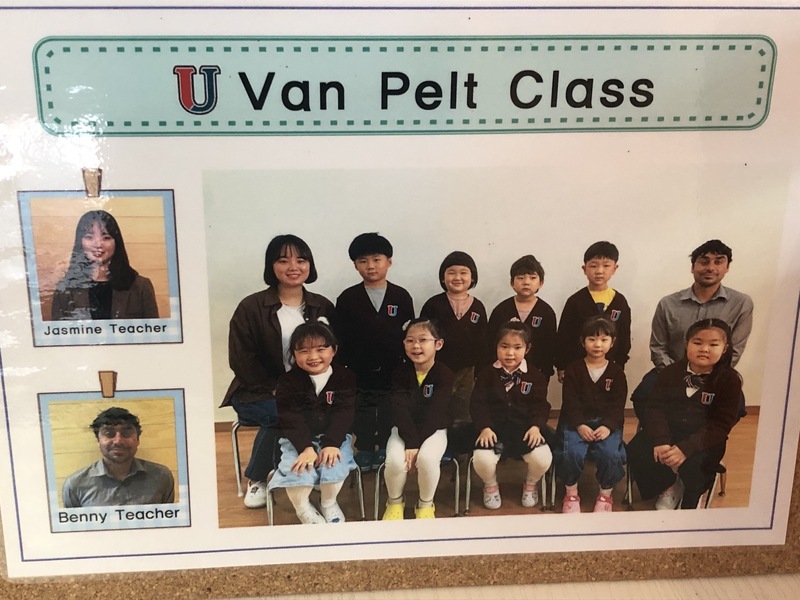 2022-03
2022-03Teaching in Korea
During the height of the pandemic I began to think deeply about what i wanted to do if things ever got "Back to normal." I'd spent my entire life in San Jose California, and decided I wanted to get out and do something different. In early 2021 I went through the process of becoming certified to teach English abroad. I was eventually hired by an English academy in South Korea for a one year contract in the fall of 2021. I enjoyed it so much I ended up re-upping for another year. When I arrived I had to quarantine for one week, and my school director (essentially a principal) picked me up from my quarantine facility and brought me to my apartment, paid for by the school as part of my contract. It was an exciting adventure for me slowly adapting to a new culture and learning to navigate the country of South Korea. The attitude towards COVID was much more serious than in the U.S. The outdoor mask mandate was in force until Spring of 2022, and the indoor mandate was not lifted until January of 2023. Even coming from California, one of the U.S. states with stricter restrictions, it was an adjustment. It certainly wasn't a political issue here in South Korea. I can only speak very rudimentary Korean, but from what I could tell, nobody seemed to have a problem following government health advice. It was illuminating to see how different countries citizens can have radically different views to a crisis based on culture, beliefs, values and attitudes towards Science. Many people still choose to wear masks in public places now in the Summer of 2023. Given the tensions with the North, there is a heavy U.S. military presence in South Korea, which made it easier to connect with other English speakers and get a taste of home near the military bases. I even met my lovely partner here, a space force member stationed in the same city I teach and live in. Being shut in is what drove me to get out of my comfort zone and I'm truly glad for my experience over the past two years in Korea. I've met friends from different countries, experienced aspects of Korean culture that I love, and also have had my privilege checked by aspects of living in Korea that I'm not as fond of. I am excited to go back home this fall, but I hope to carry all I've learned about culture and life in Korea with me. In a strange way, I'm glad that at least the pandemic made me think about what I wanted to do and see once I had the freedom to explore, and I can't say enough how grateful I am for the travel I've been able to do. -
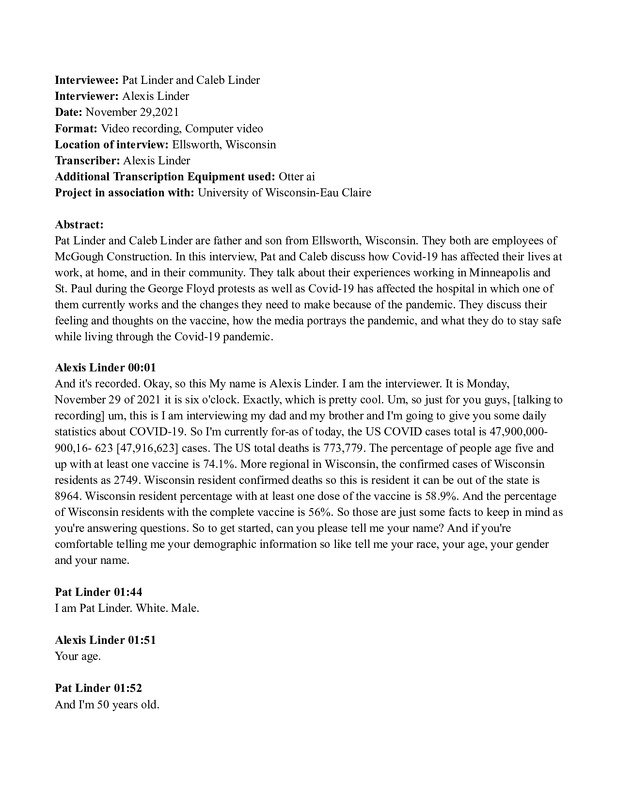 2021-11-29
2021-11-29Pat and Caleb Linder Oral History, 2021/11/29
Pat Linder and Caleb Linder are father and son from Ellsworth, Wisconsin. They both are employees of McGough Construction. In this interview, Pat and Caleb discuss how Covid-19 has affected their lives at work, at home, and in their community. They talk about their experiences working in Minneapolis and St. Paul during the George Floyd protests as well as Covid-19 has affected the hospital in which one of them currently works and the changes they need to make because of the pandemic. They discuss their feeling and thoughts on the vaccine, how the media portrays the pandemic, and what they do to stay safe while living through the Covid-19 pandemic. -
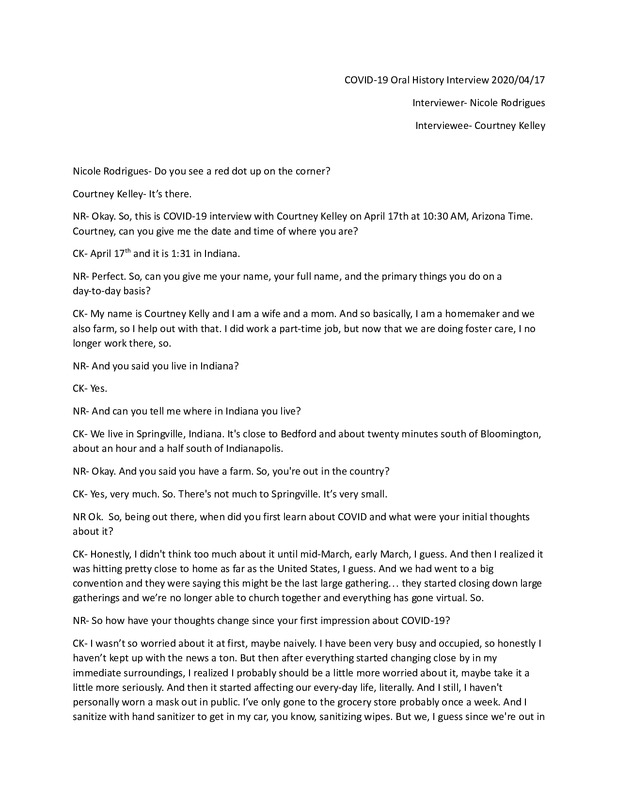 2020-04-17
2020-04-17Courtney Kelley Oral History, 2020/04/17
-
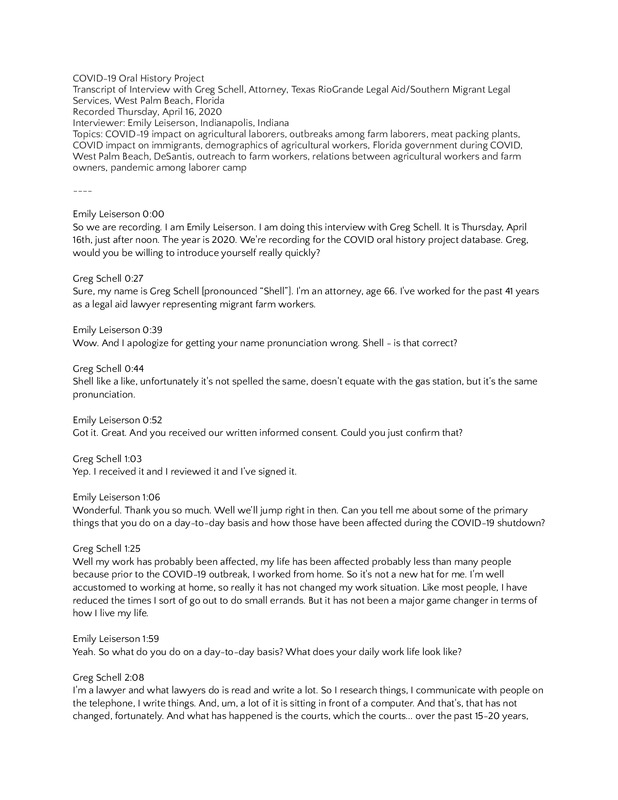 04/16/2020
04/16/2020Greg Schell Oral History, 2020/04/16
-
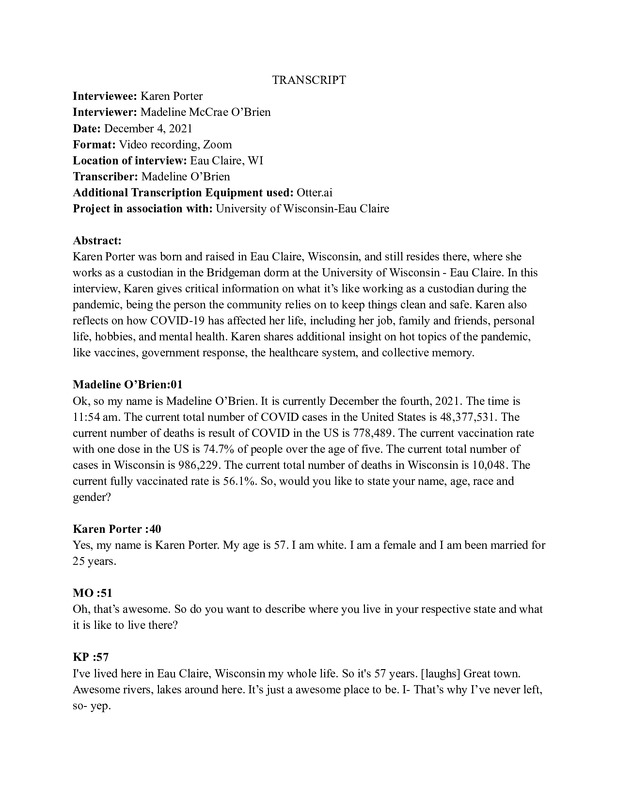 12/04/2021
12/04/2021Karen Porter Oral History, 2021/12/04
Karen Porter was born and raised in Eau Claire, Wisconsin, and still resides there, where she works as a custodian in the Bridgeman dorm at the University of Wisconsin - Eau Claire. In this interview, Karen gives critical information on what it’s like working as a custodian during the pandemic, being the person the community relies on to keep things clean and safe. Karen also reflects on how COVID-19 has affected her life, including her job, family and friends, personal life, hobbies, and mental health. Karen shares additional insight on hot topics of the pandemic, like vaccines, government response, the healthcare system, and collective memory. -
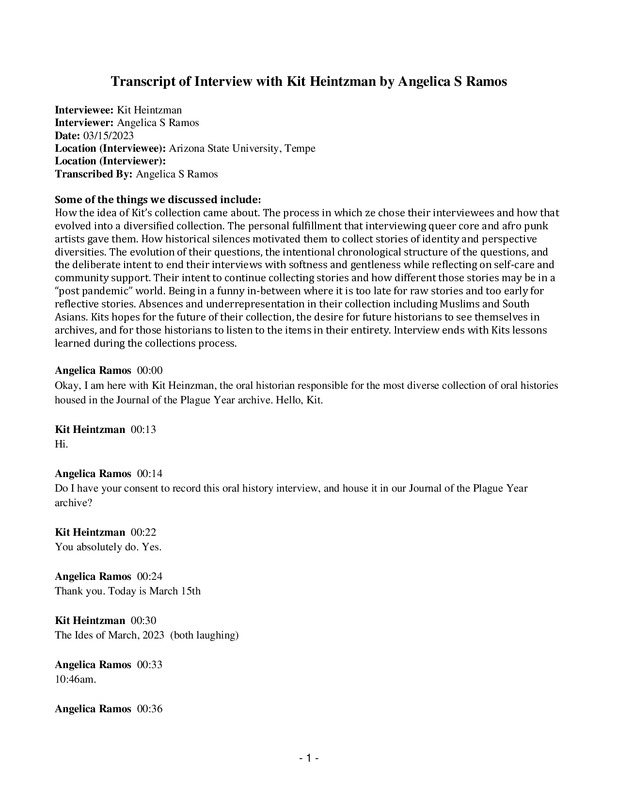 2023-03-15
2023-03-15Kit Heintzman Oral History, 2023/03/15
Kit Heintzman is a recovering academic currently residing in Lenapehoking, who was trained in the medical humanities with a special interest in queer theory, animals, and the history of nationalism. Kit has developed a singular collection of oral histories of the pandemic for A Journal of the Plague Year, collected from a range of individuals with widely diverse experiences. That collection addresses significant silences surrounding the pandemic broadly and within JOTPY more narrowly. In this item Kit is interviewed by Angelica and Erin, both with Arizona State University, about Kits collection process. -
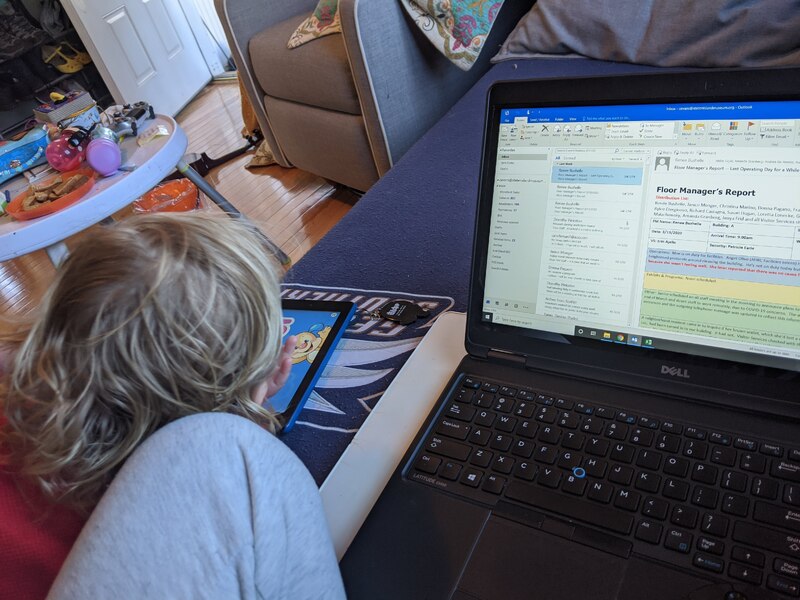 2020-03-16
2020-03-16A Year of Workspaces
When lockdown started, I was quarantining with my husband, our 2.5 year old daughter, and our elderly cat, Floofy. This series of images captures a year of my workspaces (March 16, 2020 to March 15, 2021). I worked all over our house. The living room when I was on kid duty. The porch when the weather was warm enough. A brand new desk when the porch got too hot. The bedroom when my husband, who had been laid of in March 2020, needed the desk to job hunt and eventually began doing off and on temporary work in December 2020. I returned to the office some of the time in September 2021. My husband is now fully employed again. Our daughter returned to pre-school in September 2020. Floofy died in January 2022. She had attended every work meeting with me. -
 2022-08-02
2022-08-02HST 580 Professional Experience/Archives course
The online history MA program in conjunction with the public history program at Arizona State University ran an internship for history graduate students to work on the JOTPTY archive. Internships were held in summer 2020, fall 2020, spring 2021, and spring 2022. Students were asked to submit to the archive and were often given guided assignments. The nature of the submissions varied from contributing to a specific collection to conducting an oral history. In the first internship participants developed collections and began creating calls for submissions and collecting for specific collections. In the Fall 2020 semester, students continued adding to collections and worked more extensively on oral histories. In Spring 2021, more interns experimented with the Omeka exhibits feature and finally in Spring 2022 a large portion of the internship was dedicated to data cleaning and a self-directed project. As part of their 180 hours, students were always encouraged to share their own pandemic stories or respond to varied prompts. Internship Director: Kathleen Kole de Peralta -
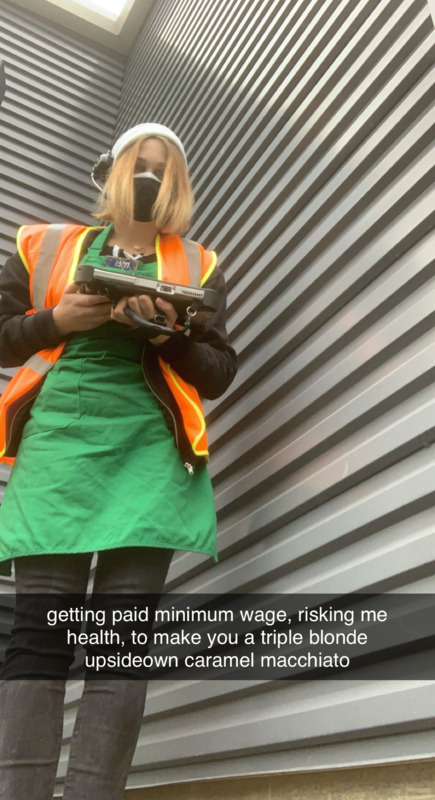 2020
2020Starbucks Barista in 2020
I worked at Starbucks Coffee Company from 2019-2021. The company begging their workers to continuously go to work under awful conditions, with little regard for their safety, took a huge mental toll, not only on me, but every barista. We were told providing coffee to our community was an "Essential" job, when in all reality is was essential for us to work to ensure that company's made a profit. We had to work to pay rent and buy food because the united states government offered little support, but were not justly compensated for our work. These pictures of myself remind me how tired I was working from 3 am to 2 pm, in the middle of a pandemic, in order to be able to afford living. -
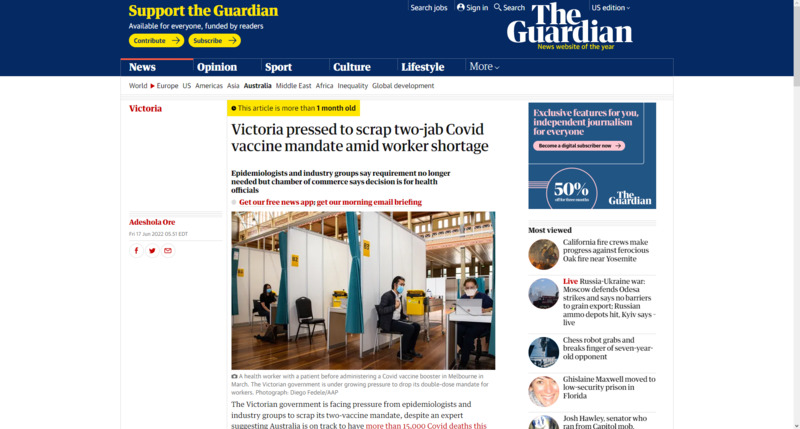 2022-06-17
2022-06-17Victoria pressed to scrap two-jab Covid vaccine mandate amid worker shortage
This is a news story from The Guardian by Adeshola Ore. The Victorian government has been pressed to stop the two-jab vaccine mandate due to a worker shortage. "While some industry groups have called for the two-dose mandate to be abolished to help ease the skilled workers shortage, the Victorian Chamber of Commerce and Industry (VCCI) said the decision was up to health officials." "Almost 95% of Victorians aged over 12 have received two doses of a Covid vaccine." -
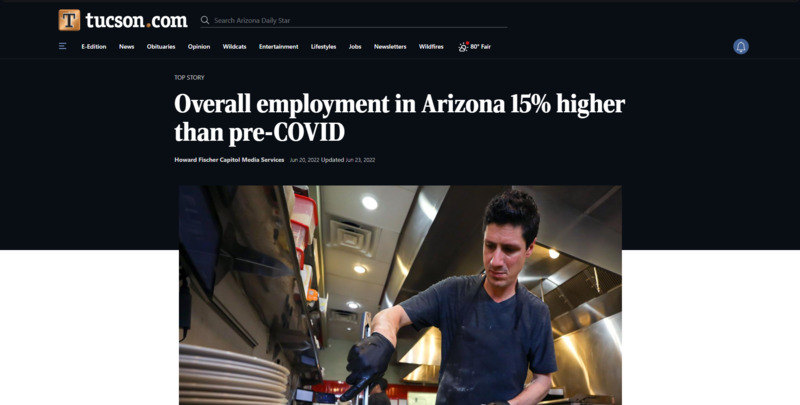 2022-06-16
2022-06-16Overall employment in Arizona 15% higher than pre-COVID
This is a news story from Tuscon.com. Overall, employment has risen by 15% compared to pre-COVID numbers. Bars, restaurants, and hotels have increased employment by 10.6% since last year. Permits issued for single and multi-family homes are down by about 16% compared to last year. There is also a 32.6% price increase on energy prices, being driven by rising gasoline prices. Overall, this article shows economic trends in Arizona and how COVID has impacted various industries and consumer trends. -
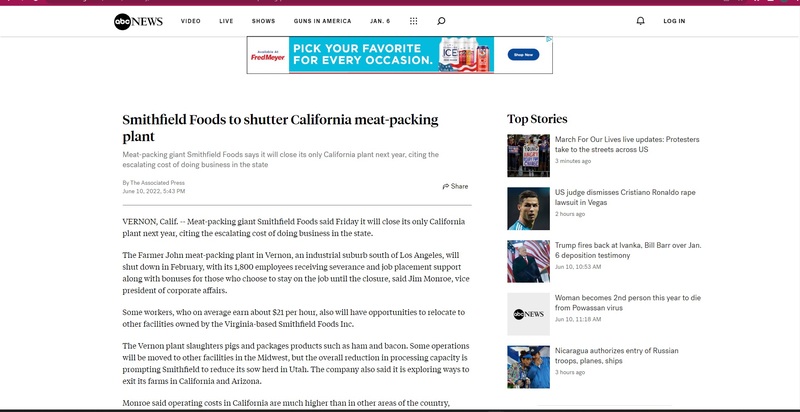 2022-06-10
2022-06-10Smithfield Foods to shutter California meat-packing plant
This is a news story from ABC News by The Associated Press. The shutdown of the Smithfield Foods plant in California is happening in part due to COVID. Some 300 employees were exposed to the virus in 2020, which created labor issues. Due to the exposure, California's Division of Occupational Safety and Health fined the company $60,000. -
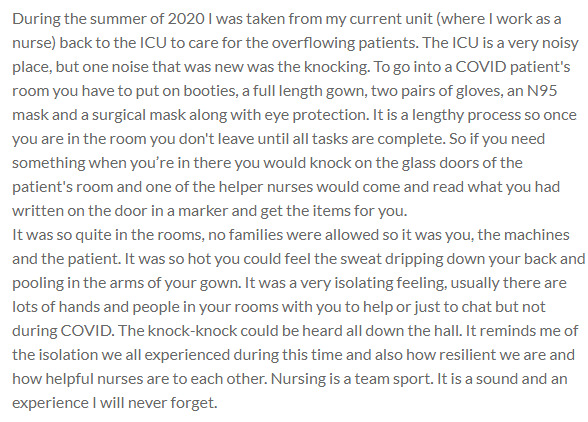 2020-08-06
2020-08-06Knock Knock
During the summer of 2020 I was taken from my current unit (where I work as a nurse) back to the ICU to care for the overflowing patients. The ICU is a very noisy place, but one noise that was new was the knocking. To go into a COVID patient's room you have to put on booties, a full length gown, two pairs of gloves, an N95 mask and a surgical mask along with eye protection. It is a lengthy process so once you are in the room you don't leave until all tasks are complete. So if you need something when you’re in there you would knock on the glass doors of the patient's room and one of the helper nurses would come and read what you had written on the door in a marker and get the items for you. It was so quite in the rooms, no families were allowed so it was you, the machines and the patient. It was so hot you could feel the sweat dripping down your back and pooling in the arms of your gown. It was a very isolating feeling, usually there are lots of hands and people in your rooms with you to help or just to chat but not during COVID. The knock-knock could be heard all down the hall. It reminds me of the isolation we all experienced during this time and also how resilient we are and how helpful nurses are to each other. Nursing is a team sport. It is a sound and an experience I will never forget. -
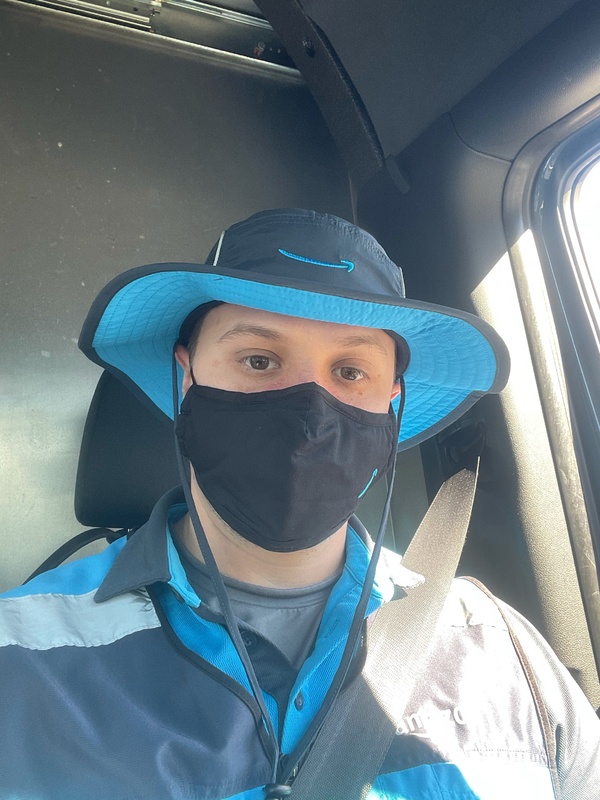 2020-08-16
2020-08-16Mask Breath and Swamp Mouth
In 2020 it was over 100 degrees Fahrenheit (38 + Celsius) in August in the eastern area of San Diego, California. I was working as a delivery driver for Amazon delivering packages around greater San Diego County. Having been about six months into the pandemic, masks were required pretty much everywhere. For health and safety, we were required to wear those masks while delivering. The picture above shows me wearing one of the masks which is made of cotton and double layered. These masks have a sleeve inside to insert a filter. Elastic strips with a stopper on the end goes around the ears to hold the mask over the nose and mouth. Because this mask irritated my ears, I took a bread wrapper twist and hooked it to the back and tied it so it wouldn't sit on my ears and was instead tied around the back of my head. This jerry rigged mask led to a tighter fit on my face. This in turn led to sweat and moisture collecting in the fabric of the mask throughout the day which led to an extremely pungent stench because of the sweat, mucus from a runny nose, and stinky breath. The other issue that caused more distress was the soaked mask. Especially on this particularly hot day, I was essentially breathing through a wet rag. Breathing through my mouth was the only option because my nose wasn't strong enough to draw in enough air. Climbing up stairs and up and down drive ways made it more difficult to breath. I had to take intermittent breaks to pull down the mask to get air and breath fresh air. Needless to say, mints, gum, and breath freshener was regularly on hand after this day. Along with lots and lots of water. -
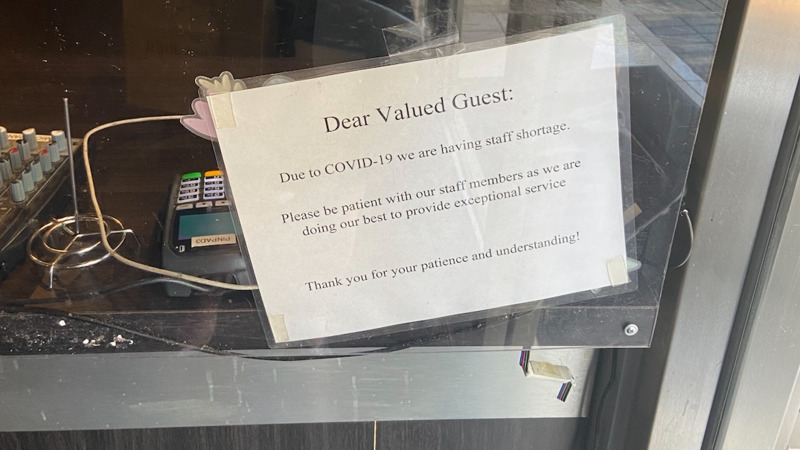 2022-05-23
2022-05-23COVID-19 Staff Shortage at Gen Korean Barbecue
Due to COVID-19, Gen, a Korean barbecue place, has had a staff shortage. Today I went there for lunch and noticed that there was fewer people working many tables than in times I have gone in the past. This speaks to the bigger labor issues that have come about since COVID. Some of it may be realizing that jobs like this aren't offering nearly enough to work there. Another possibility is that staff shortages might be happening from vaccine mandates, which depending on how many vaccines some place require, would be less appealing. The sign says that it is only due to COVID-19, but there are many components to that, so narrowing down the reason there are staff shortages could be difficult unless I asked the manager. -
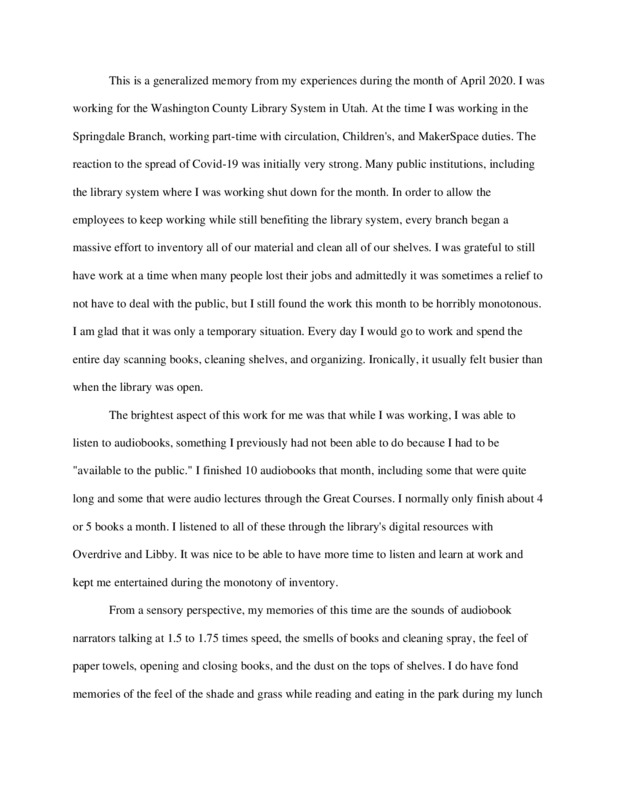 2020-04
2020-04Sudden Change to the Nature of Library Work
This story shows how pandemic radically changed workplace experience, including sensory memories, for my occupation as a library worker in Washington County Utah in April 2020. -
 2022-05-20
2022-05-20How covid didn't really effect me.
My name is Kasper, I live in the U.S. and I was 24 at the time the novel corona virus first started to cause shutdowns nation wide and world wide. I did not have the luxury of staying sheltered in place as I worked for a company that was deemed necessary to operate no matter what. My co-workers and I were basically told that our company will close when the federal government completely shuts down. That never happened. All throughout the pandemic I did not notice many changes to my life other than lack of major social events. I still hung out with friends and didn't really take the whole shut down seriously. I never had anything major happen to anyone I knew until the second year. That being said I never felt that hiding was going to solve the whole pandemic issue as many people believed it would. I spent a lot of time riding motorcycles with my wife and friends living my life to the best of my ability. One thing that did change was the whole mask dilemma. I wasn't someone against masks but I do wish the whole situation would have been handled differently. I feel that the picture above can illustrate that I did not nor will I ever let anything stop me from living and enjoying my life -
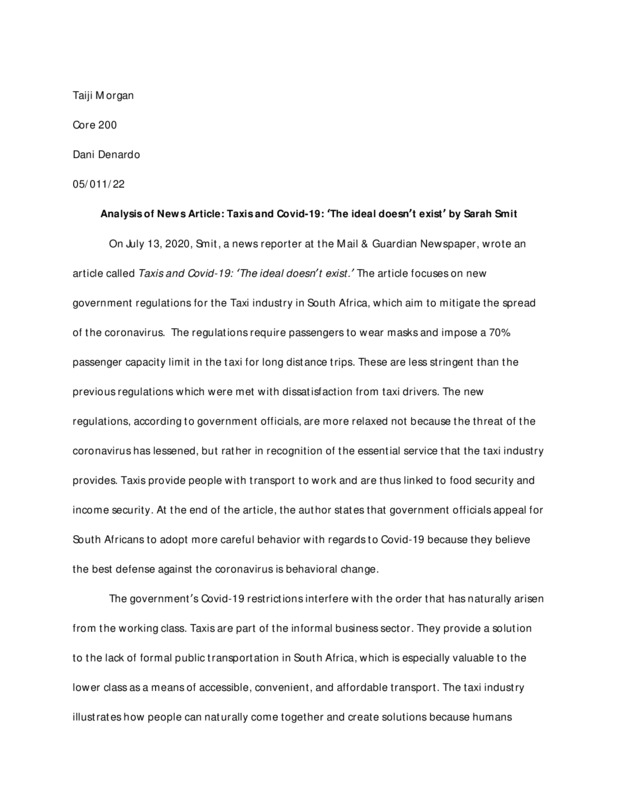 2022-05-16
2022-05-16Analysis of a news article about state restrictions on the informal taxi industry in South Africa
I am from South Africa. I wrote this analysis of a news article about Covid-19 regulations on the taxi industry in South Africa because during the pandemic I have heard many middle class people complain that working class people are irresponsible for traveling in crowded taxi's to work. My analysis pushes against this narrative, and illustrates how restricting the taxi industry is unjust, oppressive and unhelpful. Moreover, I suggest some alternative ways government can be helping. -
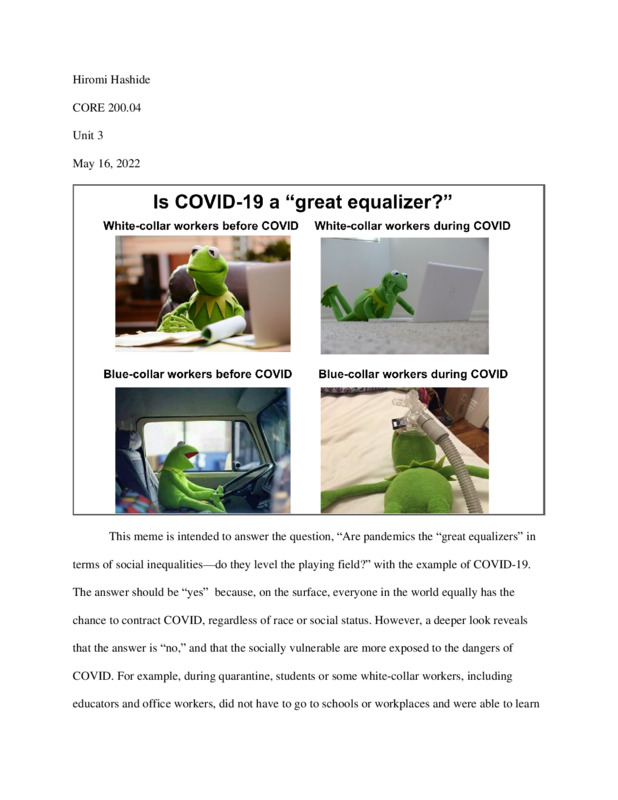 2020-05-16
2020-05-16Is COVID-19 a "Great Equalizer?" [DUPLICATE]
I made two memes. The first meme is intended to answer the question, “Are pandemics the “great equalizers” in terms of social inequalities—do they level the playing field?” with the example of COVID-19. And the meme says the answer is “no,” and that the socially vulnerable are more exposed to the dangers of COVID. The second meme is intended to answer the question, “Have you observed any patterns of human behavior with the Covid-19 pandemic?” Former President Trump called COVID the “China Virus” and fueled people’s hatred of Asians. This meme tries to remind the audience of his negative remarks but in a humorous way without offending Asian populations. It also illustrates how words can magnify feelings of racism, fear, and uncertainty, which can result in scapegoating. This meme gives the audience an opportunity to learn more about the unfair treatment of Asians during the pandemic and why it happened. -
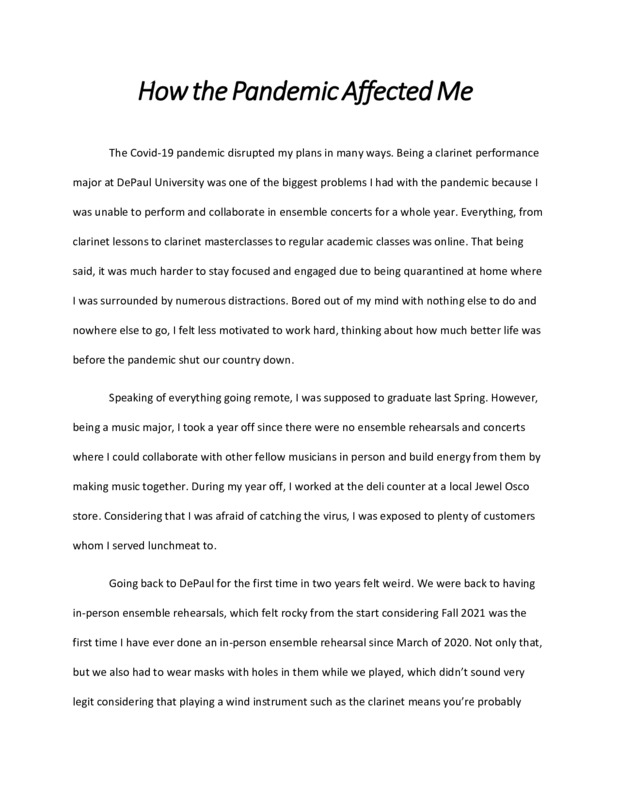 2022-05-13
2022-05-13How the Pandemic Affected Me
It's about the Pandemic disrupting my plans for graduating from college with a Bachelor's Degree in Music Performance. Being a clarinet player, I took a year off since the pandemic prevented us, musicians, from collaborating live with each other in person. -
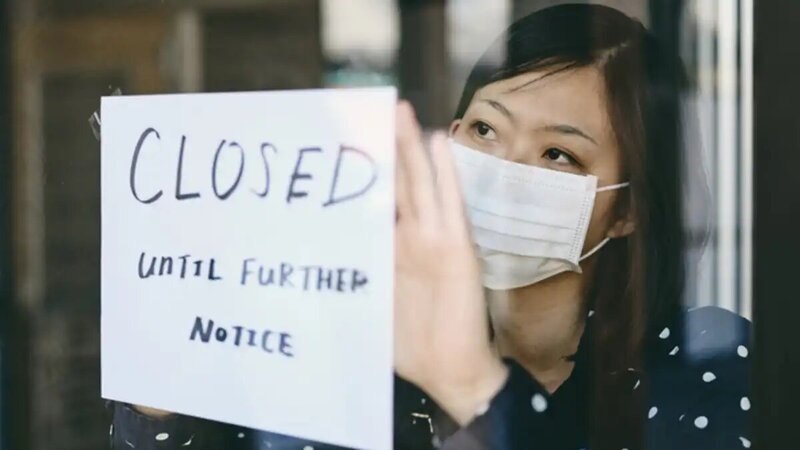 05/12/2022
05/12/2022Image for Exhibit. (DO NOT CURATE)
Image -
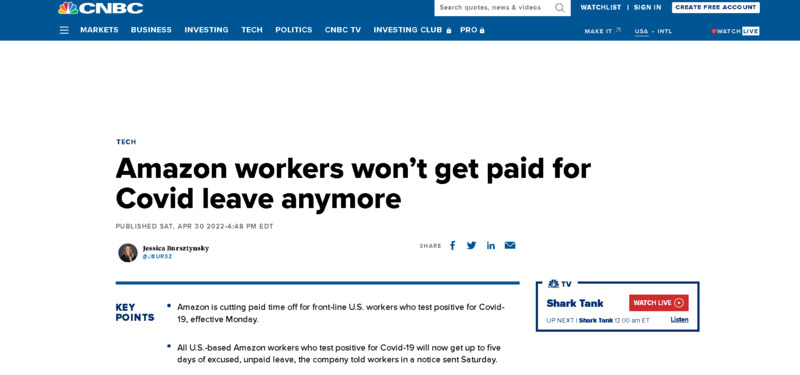 2022-04-30
2022-04-30Amazon workers won’t get paid for Covid leave anymore
This is a news story from CNBC News by Jessica Bursztynsky. Amazon is cutting pay for frontline workers that test positive for COVID. The new policy is that workers who test positive will now be given five days of unpaid, excused leave. Amazon added that workers waiting for Covid test results will no longer have time off excused since rapid tests are now widely available. This decision has sparked backlash from pro-union workers who are arguing for better working conditions. -
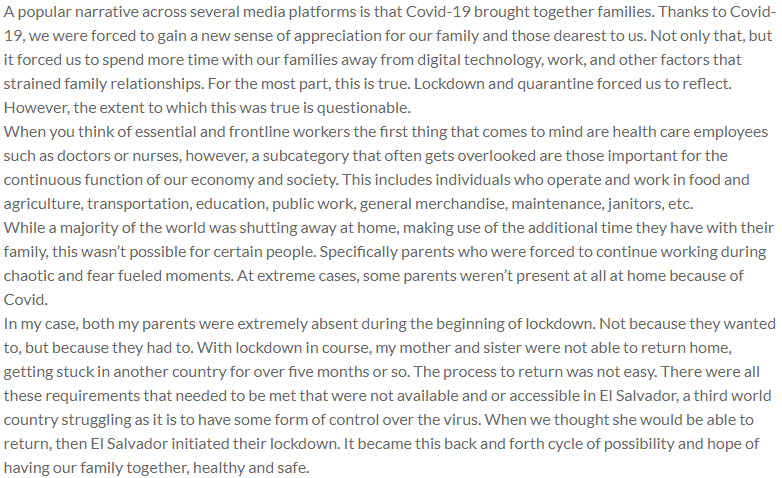 2022-05-04
2022-05-04Families during COVID
A popular narrative across several media platforms is that Covid-19 brought together families. Thanks to Covid-19, we were forced to gain a new sense of appreciation for our family and those dearest to us. Not only that, but it forced us to spend more time with our families away from digital technology, work, and other factors that strained family relationships. For the most part, this is true. Lockdown and quarantine forced us to reflect. However, the extent to which this was true is questionable. When you think of essential and frontline workers the first thing that comes to mind are health care employees such as doctors or nurses, however, a subcategory that often gets overlooked are those important for the continuous function of our economy and society. This includes individuals who operate and work in food and agriculture, transportation, education, public work, general merchandise, maintenance, janitors, etc. While a majority of the world was shutting away at home, making use of the additional time they have with their family, this wasn’t possible for certain people. Specifically parents who were forced to continue working during chaotic and fear fueled moments. At extreme cases, some parents weren’t present at all at home because of Covid. In my case, both my parents were extremely absent during the beginning of lockdown. Not because they wanted to, but because they had to. With lockdown in course, my mother and sister were not able to return home, getting stuck in another country for over five months or so. The process to return was not easy. There were all these requirements that needed to be met that were not available and or accessible in El Salvador, a third world country struggling as it is to have some form of control over the virus. When we thought she would be able to return, then El Salvador initiated their lockdown. It became this back and forth cycle of possibility and hope of having our family together, healthy and safe. My father on the other hand had to continue showing up to work, working ridiculous hours. When the whole world including my father was consumed by fear and confusion, there was no room to process and plan. My father, an employee of a multinational beverage corporation, experienced no change in his routine. On the contrary, besides wearing a mask, everything remained the same; crowded working spaces, no social distancing, etc. My sisters and I questioned why he continued to go to work knowing the danger that posses to not only his health and safety but also ours. His reason was “because the world doesn’t stop. There are still expenses and bills to pay regardless so not showing up is not an option.” This made me question just how many parents continue to work because they need the money to survive, especially at the beginning of the pandemic when many businesses were taking advantage of the short supply of items such as disinfecting spray, wipes, toilet paper, etc. and committing price gouging, knowing people were desperate for such things. That being said, stories as such continue to expose the disproportionate disadvantages that many low income communities and working classes face. Not only that but the additional strains placed on several families because of Covid and just how important resource and accessibility is. -
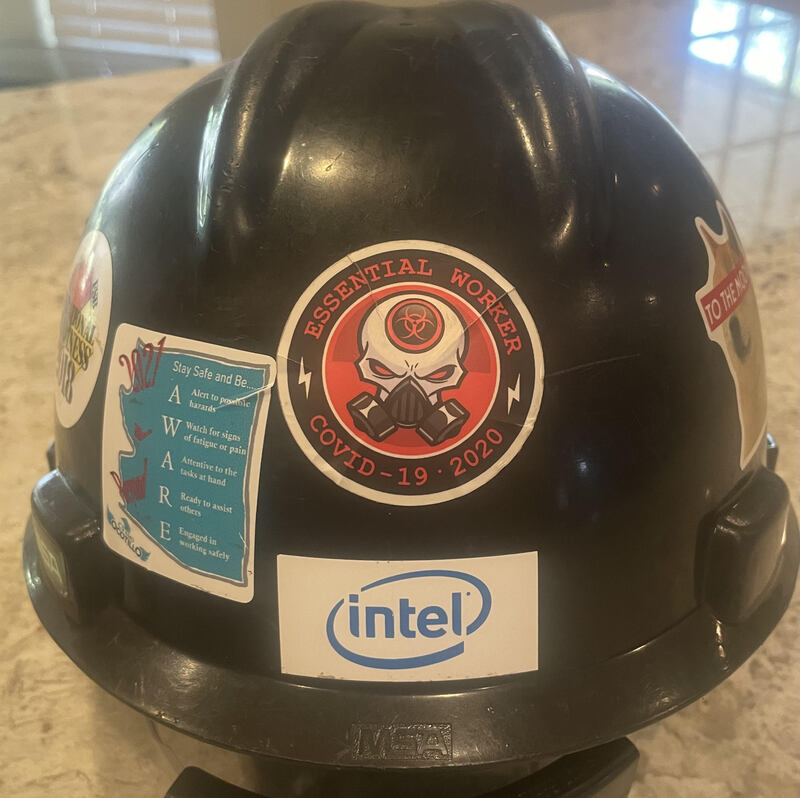 2020-05-18
2020-05-18Essential Worker Hard Hat Sticker
The attached picture is a part of my story during the pandemic. I work in the semi-conductor industry at a site that makes a large amount of important computer chips that are vital throughout the world. Our site was experiencing the pandemic just like everyone else, parallel to a time when everything we manufactured was in extreme demand due to many people working from home, schools teaching from a distance, cars needing chips, and medical equipment in high demand. It was absolutely critical that our site continued to operate safely and could not shut down. Our site and corporate managers made policies to ensure that only the minimum number of critical employees were on site to limit the chances of COVID-19 transmission, while following state-mandated essential rules during the early pandemic shutdowns. I was given a form to travel with and this sticker, additionally our badges would not let us in the site without specific essential worker access. This sticker is a daily reminder of what a crazy time I was part of, working on our site with minimal people pulling together to enable people to have the technology the needed to keep the world moving, from home... -
2022-04-29
It's The Little Things
The pandemic was full of many things that turned the world upside down: the loss of jobs, death, and the decline in mental health for many students. I remember when the semester was transferred to fully online, many students like myself celebrated for the extended Spring Break and the ability to attend Zoom classes in pajamas. However, months passed and the daily lack of contact with acquaintances and friends, isolation, and lack of activities turned the days quite mundane quickly. The drastic change in an active lifestyle to such a slow paced one definitely had a negative impact on conditions such as depressive symptoms, health anxiety, and an overall learning curve of the lifestyle. Digging deeper, I know many families whose breadwinner of the family lost their job because many places were letting their staff go due to the lack of demand of labor. When dealing with a global pandemic, death was also a central topic to deal with. Many countries did not have access to medical equipment such as ventilators and thousands of people were dying in my motherland. I personally lost some family members and many people I know have as well. While the pandemic introduced our lives to a dark state, there was a slight silver lining, and that was spending time with the loved ones. Over the years before the pandemic, I feel like the world moved at an unbearably fast pace. My days consisted of going to class and work, possibly spending some time with friends, doing homework, and sleeping for the most part. As the world started to slow down because of the COVID pandemic, my father was finally able to work from home, my sister had online classes, and my mother didn’t have to rush to pick my sister up from school. Often, our meals during dinner would be inconsistent and spent near the TV as everyone had their own schedules. However, when the pandemic hit, it was advised to not eat at restaurants and take out fast food. Such restrictions led to trying out new recipes and laughing in the kitchen. Little moments such as conversations at the dinner table are still some of my favorite memories. In addition to cherished time with my family, I was able to finally rediscovered some hobbies that I used to enjoy years ago. Before the pandemic, my life had begun to revolve only around academics and I had forgotten what it felt like to spend the evening painting or trying out a new dance. However, spending months at a time at home forced me to redirect myself to other forms of entertainment when there was no use of travelling to other places. This really helped me define myself as someone who has so many other interests rather than just a student who studied 24/7. I still try to carry these hobbies into my schedule now that the world is slowly coming back to its fast pace. -
2020-03-13
Living through A Pandemic
I can clearly remember when the pandemic began and as it progressed. I was in my senior year of high school. Before we understood the magnitude of what was going on there was a general consensus that it would be over in a few weeks. There is a culture with the media that trends only last a short time and we move on as a society. We all thought this would be another trend. A few months later and many things were still shut down. I finished school online and got my diploma in my car. We wore masks everywhere to stop the spread and everyone kept hand sanitizer on them. I also worked in food service at the time which was considered an essential business. We got extra pay and had extra precautions to follow. A few steps that were put into place were timers to wash hands at least once every 30 minutes. When masks started to be required they were sold out. I made a makeshift mask out of hair ties and a bandana. Soon Covid-19 tests became widely available and that created individual quarantines. People would test every time they came in contact. In the beginning, people were worried about paying their bills. Both of my parents owned small businesses. We had to sell our home to scrape by. As time passed the country made accommodations to open businesses up again. Two years later and we are still majorly affected. Now we are affected by product and labor shortages. Often grocery stores are out of certain products. However many businesses created contactless services such as grocery pick up, and delivery became more widely common. -
2020-03-01
Covid-19 Life
When covid first began, it did not have a huge impact on my life and the lives closest to me. The two week quarantine was more of a vacation rather than a punishment to me and my friends. However, as the months went by and I was the only one that had to go back to work due to being an "essential worker" while my friends did not was a blow to me personally. I continued to work 40 hour weeks and lost thousands of dollars monthly due to the low pay and being in a sales job. My friends were in the restaurant business so they continued to get unemployment and made more than me. This was a very annoying to me. I would never hold that against them since I would have done the same thing if given the opportunity. As time went on, it became a different type of annoyance from dealing with people who refused to wear a mask and gave constant issues to me and my coworkers. Our company had rules and while I had to wear the mask 8 hours a day, the customers did a fraction of that and still would constantly complain. I understand they can be annoying but it did not affect their breathing like they claimed. I had a couple compare themselves to Rosa Parks by "refusing to wear a mask to make a change" which got under my skin. The way the American government went about preventing covid was done in a terrible manner and I am extremely glad we are past the true heart of the pandemic. -
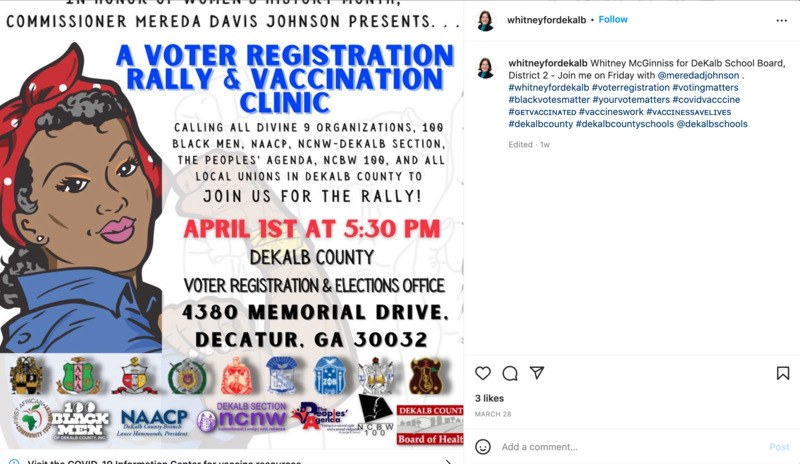 2022-03-28
2022-03-28A Voter Registration Rally & Vaccine Clinic
This is an Instagram post by whitneyfordekalb. This is an advertisement for people to attend a voter registration and vaccine clinic. It is calling on a few Black organizations in addition to unions to join the rally. Below are a few sponsors of the event. This event is in Georgia. -
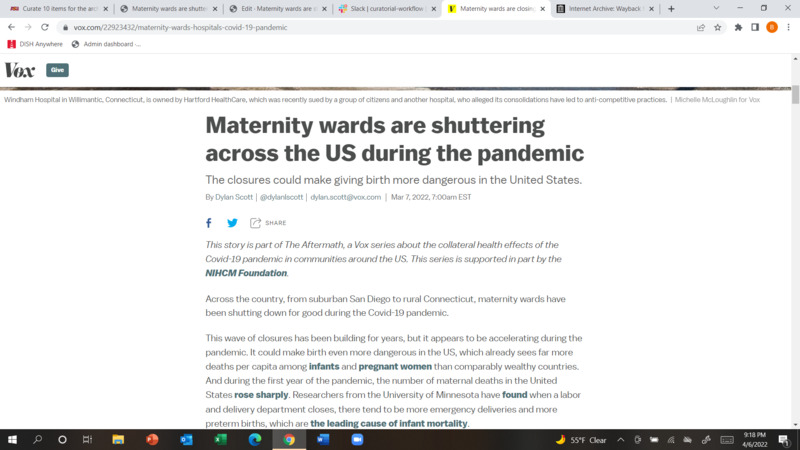 2022-03-07
2022-03-07Maternity wards are shuttering across the US during the pandemic
This is a news story from Vox, written by Dylan Scott. Across the nation, maternity wards have been shutting down, making things more dangerous for new mothers. Due to these closures, there has been an increased number in deaths of both infants and pregnant women. These losses of maternity wards have been harshest on those of low income, as well as Black and Hispanic women. Part of these closures have happened due to shortages of doctors, nurses, and other hospital staff during the pandemic. The closure of more maternity wards also means women having to travel further to get the care they need. The timing makes this even more difficult during labor, as complications can happen during that, increasing chances of death. Overall, this article shows the ways that the ripple effects from COVID not only affect the mortality rates of mothers and babies, but disproportionately hurt poor, Black, and Hispanic women. -
 2022-02-17
2022-02-17Elon Musk Compares Justin Trudeau To Hitler In Bizarre Response To Canadian Trucker Protests
This is a news story from Your Tango by Isaac Serna-Diez. This is about a Twitter rant, where Elon Musk, owner of Tesla, compares Prime Minister Justin Trudeau to Adolf Hitler over the Canadian Trucker Protests. In January, both the United States and Canada imposed vaccine mandates. According to the American Trucking Association, only 50-60% of all truckers are vaccinated. The truckers have created a convoy that blocks traffic across the US-Canada border in response to the mandates. Trudeau's response to this was to invoke the Emergencies Act, which has't been used since 1988. The Emergencies Act allows for freezing of bank accounts and funds in order to take money away from those protesting. These freezes would also impact things like GoFundMe and the ability to raise funds from that site. It also allows for military involvement, but Trudeau says that he has no plans of doing so. Musk's response to what Trudeau imposed economically on protesters prompted him to promote cryptocurrency more. -
 2022-01-19
2022-01-19National Postal Museum closes due to COVID-19
This article discusses the closure of the Smithsonian National Postal Museum in Washington D.C in January of 2022. This is significant due to the fact that its closure is a result of staffing shortages, which have been affecting museums all over the country during the COVID-19 pandemic. This is a significant contribution to the archives because museums do not have a lot of representation within the archives, especially postal museums. The article is important to me personally because I was able to visit there once while I was in Washington D.C., and it was an interesting experience. -
 2020-04-20
2020-04-20Stacking Refrigerators: A Pandemic Work Story
This image is of me working at a refrigerator plant during the Spring of 2021. Before I started working at my law firm, I bounced around and did odd jobs to make ends meet. I came across this plant job in my hometown because the plant was suffering from severe labor shortages due to COVID-19. The plant was offering higher pay due to labor shortages and was offering to hire in employees faster because of it. We were required to wear mask inside the plant at all times regardless of it being extremely hot and were expected to do overtime and come in on weekends if needed. I did not only want to highlight the work conditions of this job but illuminate businesses began to operate due to the dire conditions of the pandemic. I also wanted to highlight how some people had to continue to work during the pandemic despite setbacks with workers, production numbers, and work conditions. It is important to illuminate stories like these because many essential workers stories are not heard and recognized. Despite unemployment numbers being at all-time high nationally, people are still working. Therefore, it is important to recognize the sacrifices and contributions workers like I had to make in order to continue to support ourselves and our loved ones. -
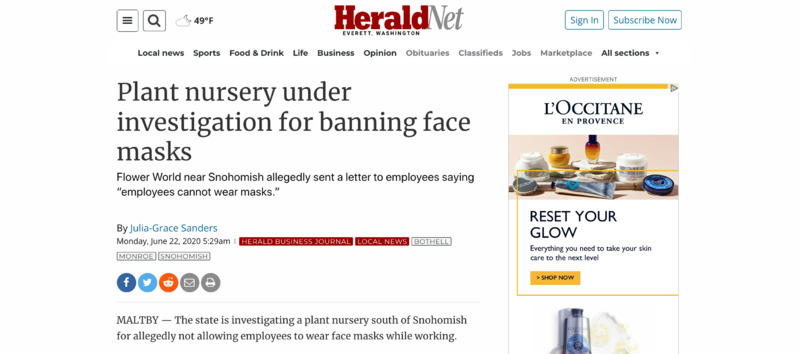 2020-07-03
2020-07-03Bad science, bad business practices
The attached article is about a plant nursery in Snohomish, Washington that banned its employees from wearing face masks on June 3, 2020. This business did not take safety precautions for its employees seriously, and actively encouraged and promoted unsafe practices. This is something that is worth being documented in the JOPTY due to the fact that the stereotype of Western Washington state is that it is very liberal, very progressive. But there are still many pockets of areas that still are not. It’s important to remember that this stereotype isn’t true. I think this is also something that is another example of the general public not taking the lives and significance that service industry/customer service workers seriously. -
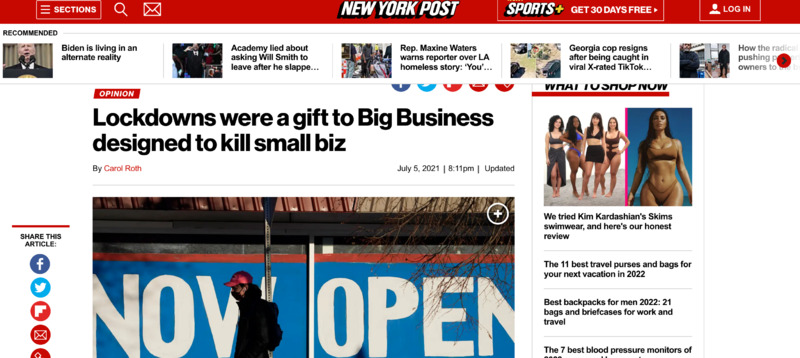 2021-07-05
2021-07-05Lockdowns Were a Gift to Big Business Designed to Kill Small Biz
This is an opinion piece by Carol Roth for the New York Post. This news story is about ways in which the lockdowns in 2020/2021 hurt small businesses, but helped big businesses. Roth claims that during the pandemic, small businesses are hitting half or less than half of their pre-lockdown revenue. Some businesses, Roth claims, possibly won’t recover at all. This article says that in 2020, the Hamilton Project accounted for 400,000 closures. I find this article to be important, as I think the business side of the pandemic needs to be told more, as these effects on small businesses impact the local and state economies, in addition to what jobs are available for people looking to go back to work after lockdowns end. -
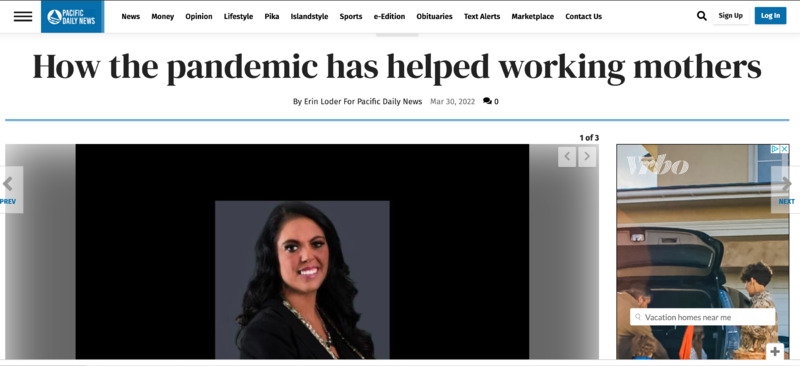 2022-03-31
2022-03-31How the Pandemic has Helped Working Mothers
This is an opinion piece by Erin Loder for the Pacific Daily News. This opinion piece details the benefits that COVID-19 has brought for working mothers. Loder, a working mother herself, describes having a more flexible schedule to help take care of kids. She says that in the workforce, women often get penalized for having kids much more often than men do, and with working from home, she is allowed to take more time for her kids and save money by not having to pay for daycare as often. Overall, she sees this as a positive turn for working mothers, since the pandemic has given women opportunities to raise their families more as they work. I found this opinion piece a nice take, as it brings out some of the positives women have experienced due to changes having to be made in work-life balance for many people out there. -
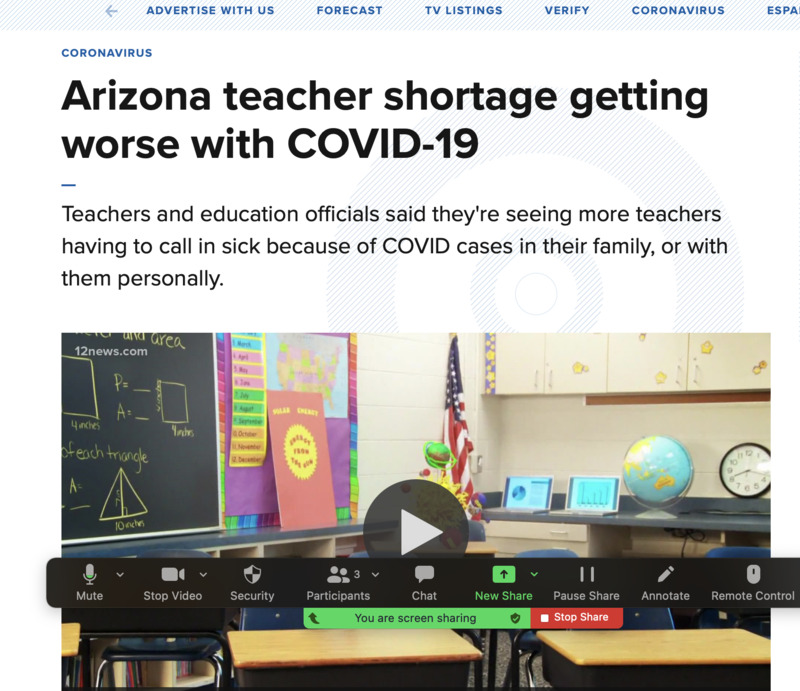 2022-01-11
2022-01-11Arizona teacher shortage getting worse with COVID-19
Arizona teachers have struggled with obtaining higher pay and better funding for years. Add to that a legislative body that doesn’t prioritize educational funding, improving teaching conditions or student learning. When Covid-19 reared its ugly head, the pressure public school teachers normally deal with in overcrowded, undersupplied classrooms intensified and – for many overworked teachers – this was the last straw. Teachers who were in a position to took early retirement. Others simply left the profession for the private sector. Still, some remained and adapted to whatever model of learning their school district employed – sometimes on a week-to-week basis. Now that most schools have returned to an in-person modality, teachers are still leaving the classroom. This article sheds lights on the teacher shortage and how, even still, Arizona educators are contending with Covid-19 in their classrooms and families, leading them to reconsider their decision to stay in education. -
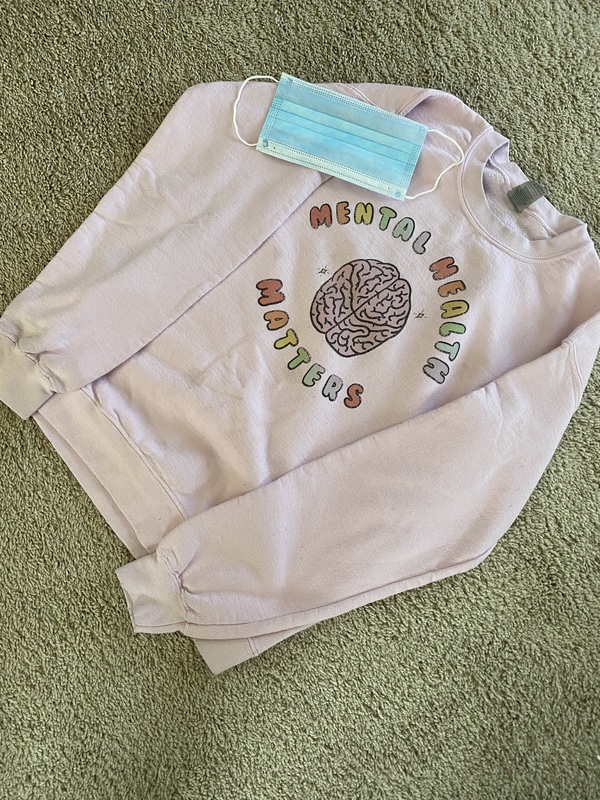 2022-03-26
2022-03-26Coping with the Pandemic--A Personal Look at Mental Health and COVID-19
According to the Center of Disease Control, in June of 2022, US adults reported considerably elevated adverse mental health conditions associated with COVID-19. Out of a survey they did on 5,412 people, 40.9 percent of respondents reported at least one adverse mental or behavioral health conditions, including symptoms of anxiety and depressive disorder which were around 31 percent. One of the causes of this is due to increase sedentary behaviors and low levels of physical activity due to quarantines and lack of business operation. Over the past two years, government mandated quarantine, work from home, and online schooling has caused me to stay at home for longer periods of time than what I use to. Because of this sedentary behavior, I had dealt with the negative effects of isolation, stress, and anxiety on both my mental and physical health. According to the World Health Organization, 150 minutes of moderate exercise or physical activity is usually recommended per week, however, with working a full-time job and being in school, the question that remains is how that is possible? I have learned to accommodate these physical needs indoors, by taking active breaks during the day and exercising at home. While this does not necessarily help with isolation and loneliness sometimes, I have learned to take these matters one day at a time and not shun myself for feelings them. CDC argues that from a recent comprehensive review that the impact of COVID-19 on mental health particularly seems to affect more young women disproportionally than any other group. Therefore, I recommend any young adult or women facing severe mental health to take advantage of online support or mental health services through telehealth such as ZocDoc. It is important to highlight COVID-19's impact on mental health in the United States and my personal life because it shows how the pandemic changed the means and the ways we received mental health services in the past. As the pandemic ventures on, people like myself will continue to have to find ways to cope and receive services for our problems. Thanks to the pandemic, much of our mental health problems have come more to the forefront due to us having ample amounts of time now to navigate and deal these issues unlike never before. -
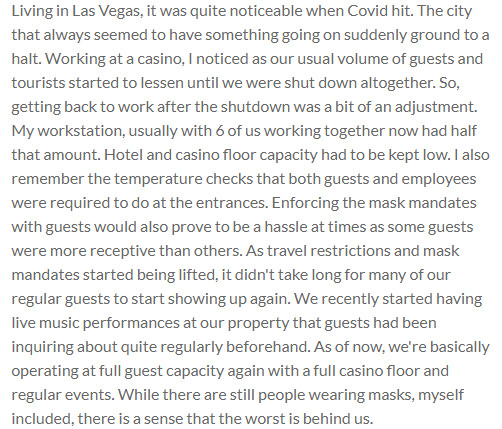 2022-03-20
2022-03-20Working in a Casino Post-Covid
Living in Las Vegas, it was quite noticeable when Covid hit. The city that always seemed to have something going on suddenly ground to a halt. Working at a casino, I noticed as our usual volume of guests and tourists started to lessen until we were shut down altogether. So, getting back to work after the shutdown was a bit of an adjustment. My workstation, usually with 6 of us working together now had half that amount. Hotel and casino floor capacity had to be kept low. I also remember the temperature checks that both guests and employees were required to do at the entrances. Enforcing the mask mandates with guests would also prove to be a hassle at times as some guests were more receptive than others. As travel restrictions and mask mandates started being lifted, it didn't take long for many of our regular guests to start showing up again. We recently started having live music performances at our property that guests had been inquiring about quite regularly beforehand. As of now, we're basically operating at full guest capacity again with a full casino floor and regular events. While there are still people wearing masks, myself included, there is a sense that the worst is behind us. -
 2022-03-20
2022-03-20Work, Food, Viki, and Home
If there were anything that COVID changed in my everyday schedule, it would be helping me get closer to family. Ever since the pandemic, we have hardly gone outside the house unless it was for work or shopping for groceries. A typical day in my life would be waking up to check my emails and messages. After moving from Utah to Washington after graduating, I managed to find a job at a small business called Sozo Gifts while pursuing my master's program. I wouldn't say I am not a breakfast person, so I go straight to work after getting ready. After work, I go straight home to help my sister cook dinner. When I was living by myself, I ordered food a lot through Uber Eats and Door Dash. Being with my family during the pandemic helped me change my eating habits. We cook traditional Samoan food such as baked taro, pisupo, palusami, fai'ai pilikaki, or traditional chicken soup. After dinner, we all tend to gather around the living room and watch the latest episodes of our favorite Korean Drama. My sisters were never fans of KDrama before the pandemic, but I managed to introduce them to my favorite app, Viki Rakuten. Now, we binged watched a lot of KDramas through the Viki app, and it became our favorite thing to do as a family after dinner. I was supposed to go back home to American Samoa after graduating with my bachelor's. Unfortunately, due to the pandemic and strict lockdown and regulations back home, I wasn't able to return. But almost every evening, we would video chat with my parents and close friends back home. Now and then, my friend would send me pictures of the island. I never planned to stay in the states this long, but the pandemic has caused some setbacks and changes in my life. However, I learned to adapt to new changes, and it became a routine for me while also being grateful for letting me spend time with my family here in Washington. -
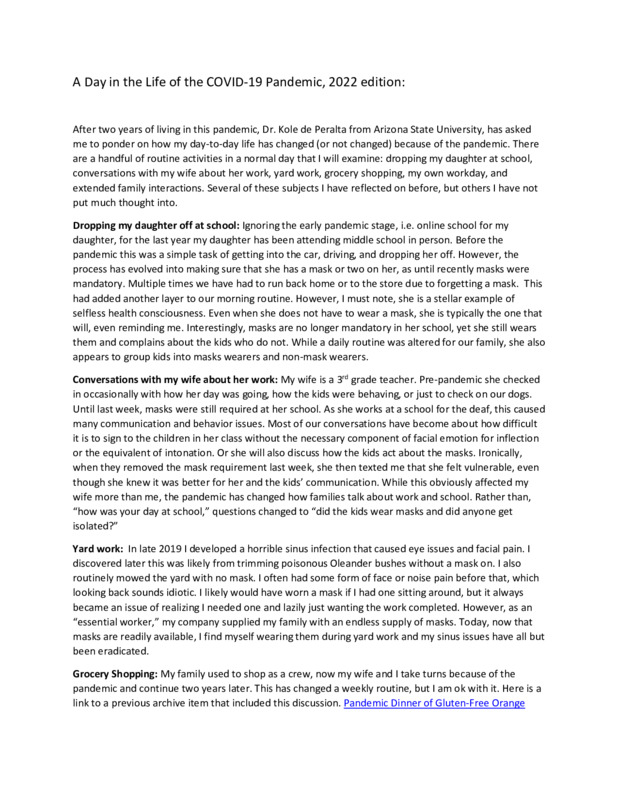 2022-03-20
2022-03-20Jason Inskeep, A Day in the Life of the COVID-19 Pandemic
A Day in the Life of the COVID-19 Pandemic, 2022 edition: After two years of living in this pandemic, Dr. Kole de Peralta from Arizona State University, has asked me to ponder on how my day-to-day life has changed (or not changed) because of the pandemic. There are a handful of routine activities in a normal day that I will examine: dropping my daughter at school, conversations with my wife about her work, yard work, grocery shopping, my own workday, and extended family interactions. Several of these subjects I have reflected on before, but others I have not put much thought into. Dropping my daughter off at school: Ignoring the early pandemic stage, i.e., online school for my daughter, for the last year my daughter has been attending middle school in person. Before the pandemic this was a simple task of getting into the car, driving, and dropping her off. However, the process has evolved into making sure that she has a mask or two on her, as until recently masks were mandatory. Multiple times we have had to run back home or to the store due to forgetting a mask. This had added another layer to our morning routine. However, I must note, she is a stellar example of selfless health consciousness. Even when she does not have to wear a mask, she is typically the one that will, even reminding me. Interestingly, masks are no longer mandatory in her school, yet she still wears them and complains about the kids who do not. While a daily routine was altered for our family, she also appears to group kids into masks wearers and non-mask wearers. Conversations with my wife about her work: My wife is a 3rd grade teacher. Pre-pandemic she checked in occasionally with how her day was going, how the kids were behaving, or just to check on our dogs. Until last week, masks were still required at her school. As she works at a school for the deaf, this caused many communication and behavior issues. Most of our conversations have become about how difficult it is to sign to the children in her class without the necessary component of facial emotion for inflection or the equivalent of intonation. Or she will also discuss how the kids act about the masks. Ironically, when they removed the mask requirement last week, she then texted me that she felt vulnerable, even though she knew it was better for her and the kids’ communication. While this obviously affected my wife more than me, the pandemic has changed how families talk about work and school. Rather than, “how was your day at school,” questions changed to “did the kids wear masks and did anyone get isolated?” Yard work: In late 2019 I developed a horrible sinus infection that caused eye issues and facial pain. I discovered later this was likely from trimming poisonous Oleander bushes without a mask on. I also routinely mowed the yard with no mask. I often had some form of face or noise pain before that, which looking back sounds idiotic. I likely would have worn a mask if I had one sitting around, but it always became an issue of realizing I needed one and lazily just wanting the work completed. However, as an “essential worker,” my company supplied my family with an endless supply of masks. Today, now that masks are readily available, I find myself wearing them during yard work and my sinus issues have all but been eradicated. Grocery Shopping: My family used to shop as a crew, now my wife and I take turns because of the pandemic and continue two years later. This has changed a weekly routine, but I am ok with it. Here is a link to a previous archive item that included this discussion, https://covid-19archive.org/s/archive/item/46478. My workday: A typical workday for me as a shift technician worker, pre-pandemic, would begin and end with a pass down meeting with our night shift. The meetings took place in one room with approximately ten people, in a central location. We would then cram as many people as would fit into golf carts and separate to four different factories for our workday. Additionally, we would sit at desks, perform routine maintenance, and assist each other throughout the day, all within cross proximity. After the pandemic, started people began getting sick and getting each other sick. I work in the semi-conductor industry and there was a parallel surge in demand for chips. Beyond just our health, it was apparent that if people were not separated, it was possible that our mega-site could negatively affect the global chip supply chain and my employer’s bottom line. Thus, jobs like mine were made “essential” and safety rules were vastly improved. Other “non-essential” people began to work from home to make the site safer for essential work. Even today, we meet in four different control rooms rather that all in one room, with ¼ the people, wear masks unless eating, cannot ride more than one person in front and one person in the back of golf carts, and must perform complex maintenance tasks six feet apart and if this is not possible wear supplied air masks. While management may remove some of the safety regulations soon, things have become more complex at my job and manufacturing industries because of COVID-19. I also have to walk up to one to two miles a day due to golf cart rules, which is probably not a bad thing. Extended family interactions: The pandemic is slowly wanning. Rather than stopping by my parent’s house or simply all agreeing to have dinner as a family for a birthday on a certain day, as it was before the pandemic, things have changed. My family spends a fair amount of time to discuss how everyone is feeling and if we should cancel before we meet if someone is sick. Thus, all our plans are much more complicated, and we find ourselves meeting up as a family less out of caution. COVID-19 has altered the type and frequency of my extended family’s interactions. The COVID-19 pandemic has changed my days. However, it seems to me that I, and those around me, always adjust to situations that at first seem so stressful. Humans are highly adaptable, even to extremely spontaneous and stressful situations. Even more than we give credit to ourselves for. This exercise shows some things I had not even thought about, because I did not have a choice and just adjusted. Which is surprising because I am known as the biggest worrier! -
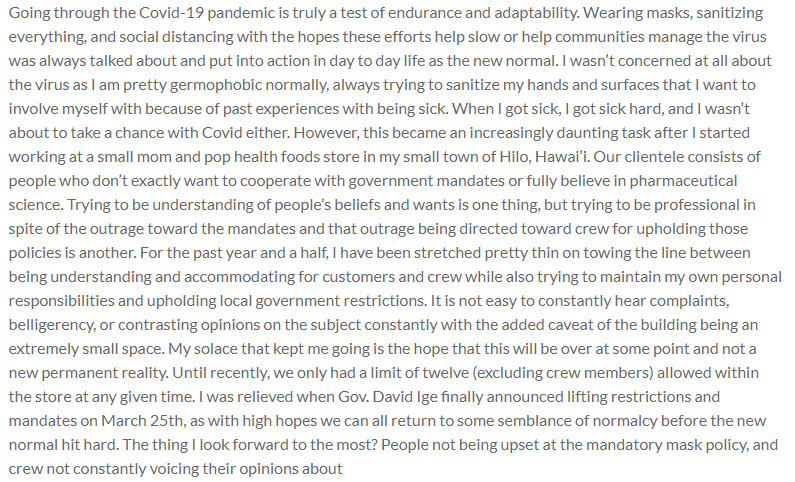 2022-03-17
2022-03-17Working Through The Pandemic
Going through the Covid-19 pandemic is truly a test of endurance and adaptability. Wearing masks, sanitizing everything, and social distancing with the hopes these efforts help slow or help communities manage the virus was always talked about and put into action in day to day life as the new normal. I wasn’t concerned at all about the virus as I am pretty germophobic normally, always trying to sanitize my hands and surfaces that I want to involve myself with because of past experiences with being sick. When I got sick, I got sick hard, and I wasn’t about to take a chance with Covid either. However, this became an increasingly daunting task after I started working at a small mom and pop health foods store in my small town of Hilo, Hawai’i. Our clientele consists of people who don’t exactly want to cooperate with government mandates or fully believe in pharmaceutical science. Trying to be understanding of people’s beliefs and wants is one thing, but trying to be professional in spite of the outrage toward the mandates and that outrage being directed toward crew for upholding those policies is another. For the past year and a half, I have been stretched pretty thin on towing the line between being understanding and accommodating for customers and crew while also trying to maintain my own personal responsibilities and upholding local government restrictions. It is not easy to constantly hear complaints, belligerency, or contrasting opinions on the subject constantly with the added caveat of the building being an extremely small space. My solace that kept me going is the hope that this will be over at some point and not a new permanent reality. Until recently, we only had a limit of twelve (excluding crew members) allowed within the store at any given time. I was relieved when Gov. David Ige finally announced lifting restrictions and mandates on March 25th, as with high hopes we can all return to some semblance of normalcy before the new normal hit hard. The thing I look forward to the most? People not being upset at the mandatory mask policy, and crew not constantly voicing their opinions about -
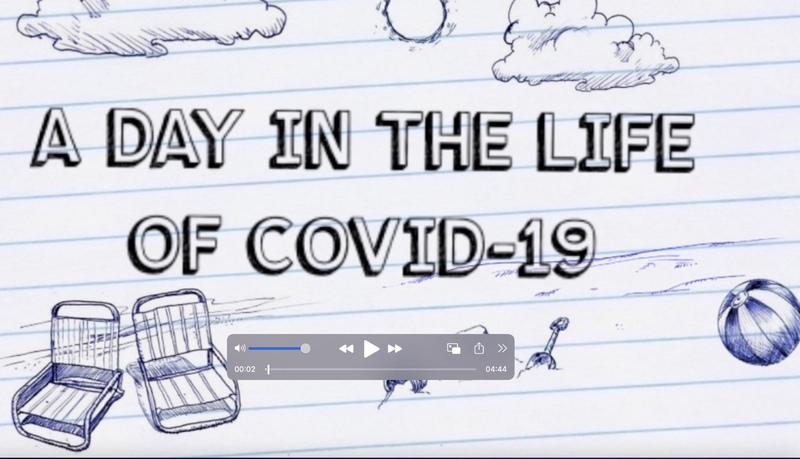 2022-03-16
2022-03-16Navigating through COVID-19: A Personal Vlog of Ashley Hampton
Spend a day with me as you see me (Ashley Hampton) navigate through a normal day in present COVID-19 in Anderson, South Carolina. I vlog about my workplace, shopping centers, and businesses in Anderson to give perspective of how COVID-19 has changed the way these institutions function on a day-to-day basis. Despite statewide coverage, not much is documented about South Carolina and COVID-19 in this archive, let alone, residential experiences. The objective of this video is added to the South Carolina COVID archive as well as highlight how personal experiences with COVID-19 may vary depending on which region you live in and community. -
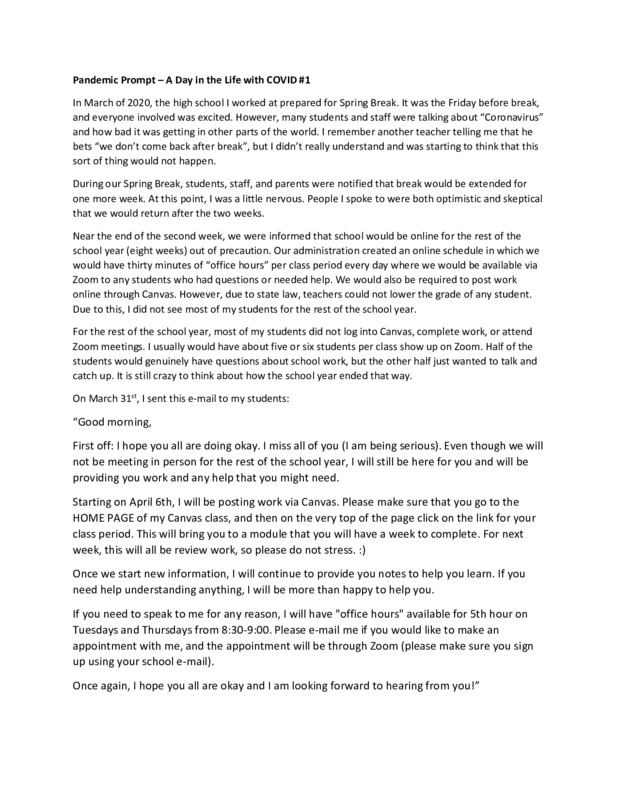 2020-03-31
2020-03-31Ending the School Year in COVID-19
I described how ending the school year during COVID-19 was. I am a high school teacher, and we went on Spring Break and never came back. I include an e-mail I sent to my students. -
2020-09-20
Discovering You Have COVID19
It was September of 2020, and I was babysitting at the time. The kids I was babysitting for were sick, but I did not think much of it, babies are sick all the time right? So, I continue going to work throughout the week. I am changing the diaper of the child, and may I add that this is a dirty, poopy diaper. I am thinking in my head, "Wow it is kind of crazy that this does not smell bad, it ALWAYS does." Suddenly it clicks in my head, I cannot smell. I go smell a candle, smells like nothing, an onion, nothing, perfume, nothing, and I am instantly in a panic. I am then wondering if I can taste anything, I try every food in the pantry, again... nothing. I immediately tell the mom I babysit for (she works from home), and she tries smelling her candle, and she smells nothing either. We go together and get tested, and we all had COVID19. We all ended up being okay and quarantine for 10 days, so its okay to laugh at the situation now. That was my most memorable moment of COVID19. -
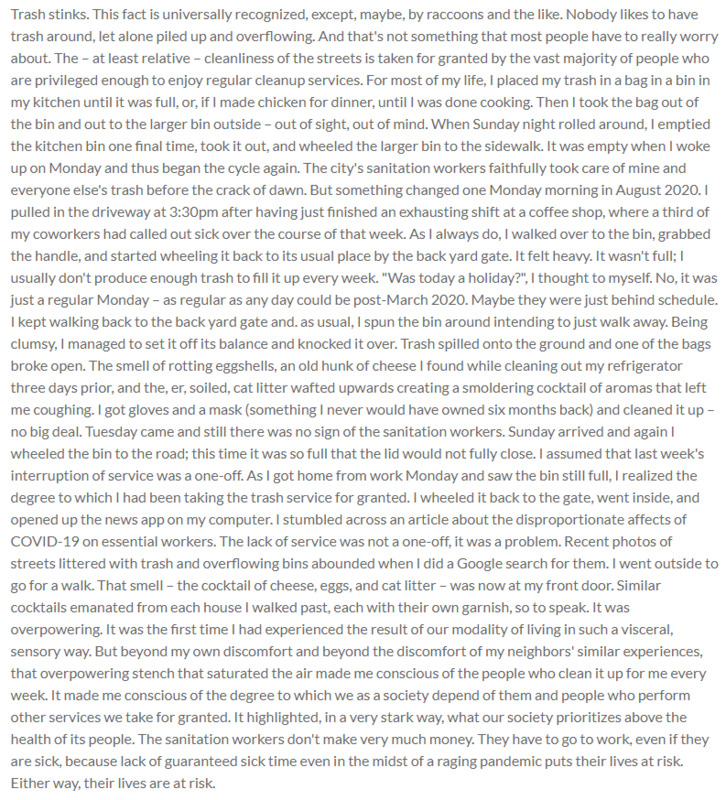 2020-08-10
2020-08-10Smelling the labor shortage
Trash stinks. This fact is universally recognized, except, maybe, by raccoons and the like. Nobody likes to have trash around, let alone piled up and overflowing. And that's not something that most people have to really worry about. The – at least relative – cleanliness of the streets is taken for granted by the vast majority of people who are privileged enough to enjoy regular cleanup services. For most of my life, I placed my trash in a bag in a bin in my kitchen until it was full, or, if I made chicken for dinner, until I was done cooking. Then I took the bag out of the bin and out to the larger bin outside – out of sight, out of mind. When Sunday night rolled around, I emptied the kitchen bin one final time, took it out, and wheeled the larger bin to the sidewalk. It was empty when I woke up on Monday and thus began the cycle again. The city's sanitation workers faithfully took care of mine and everyone else's trash before the crack of dawn. But something changed one Monday morning in August 2020. I pulled in the driveway at 3:30pm after having just finished an exhausting shift at a coffee shop, where a third of my coworkers had called out sick over the course of that week. As I always do, I walked over to the bin, grabbed the handle, and started wheeling it back to its usual place by the back yard gate. It felt heavy. It wasn't full; I usually don't produce enough trash to fill it up every week. "Was today a holiday?", I thought to myself. No, it was just a regular Monday – as regular as any day could be post-March 2020. Maybe they were just behind schedule. I kept walking back to the back yard gate and. as usual, I spun the bin around intending to just walk away. Being clumsy, I managed to set it off its balance and knocked it over. Trash spilled onto the ground and one of the bags broke open. The smell of rotting eggshells, an old hunk of cheese I found while cleaning out my refrigerator three days prior, and the, er, soiled, cat litter wafted upwards creating a smoldering cocktail of aromas that left me coughing. I got gloves and a mask (something I never would have owned six months back) and cleaned it up – no big deal. Tuesday came and still there was no sign of the sanitation workers. Sunday arrived and again I wheeled the bin to the road; this time it was so full that the lid would not fully close. I assumed that last week's interruption of service was a one-off. As I got home from work Monday and saw the bin still full, I realized the degree to which I had been taking the trash service for granted. I wheeled it back to the gate, went inside, and opened up the news app on my computer. I stumbled across an article about the disproportionate affects of COVID-19 on essential workers. The lack of service was not a one-off, it was a problem. Recent photos of streets littered with trash and overflowing bins abounded when I did a Google search for them. I went outside to go for a walk. That smell – the cocktail of cheese, eggs, and cat litter – was now at my front door. Similar cocktails emanated from each house I walked past, each with their own garnish, so to speak. It was overpowering. It was the first time I had experienced the result of our modality of living in such a visceral, sensory way. But beyond my own discomfort and beyond the discomfort of my neighbors' similar experiences, that overpowering stench that saturated the air made me conscious of the people who clean it up for me every week. It made me conscious of the degree to which we as a society depend of them and people who perform other services we take for granted. It highlighted, in a very stark way, what our society prioritizes above the health of its people. The sanitation workers don't make very much money. They have to go to work, even if they are sick, because lack of guaranteed sick time even in the midst of a raging pandemic puts their lives at risk. Either way, their lives are at risk. -
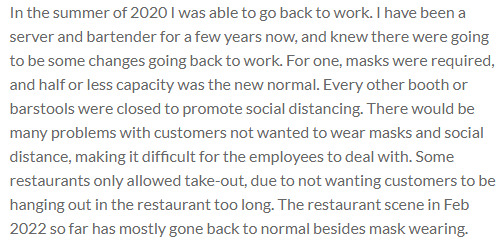 2020-08
2020-08Serving/Bartending in the Pandemic
In the summer of 2020 I was able to go back to work. I have been a server and bartender for a few years now, and knew there were going to be some changes going back to work. For one, masks were required, and half or less capacity was the new normal. Every other booth or barstools were closed to promote social distancing. There would be many problems with customers not wanted to wear masks and social distance, making it difficult for the employees to deal with. Some restaurants only allowed take-out, due to not wanting customers to be hanging out in the restaurant too long. The restaurant scene in Feb 2022 so far has mostly gone back to normal besides mask wearing. -
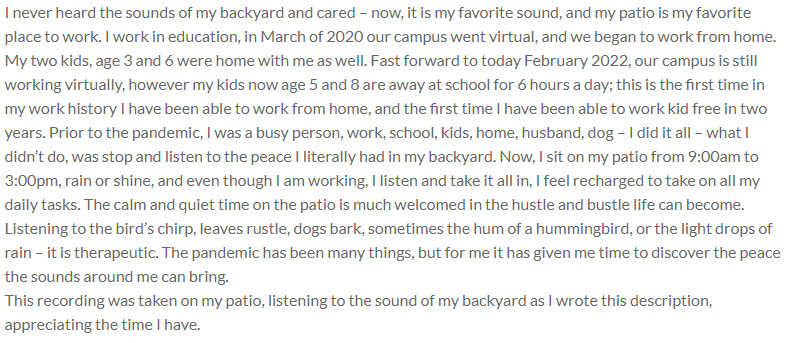 2022-02-01
2022-02-01Patio Sounds
I never heard the sounds of my backyard and cared – now, it is my favorite sound, and my patio is my favorite place to work. I work in education, in March of 2020 our campus went virtual, and we began to work from home. My two kids, age 3 and 6 were home with me as well. Fast forward to today February 2022, our campus is still working virtually, however my kids now age 5 and 8 are away at school for 6 hours a day; this is the first time in my work history I have been able to work from home, and the first time I have been able to work kid free in two years. Prior to the pandemic, I was a busy person, work, school, kids, home, husband, dog – I did it all – what I didn’t do, was stop and listen to the peace I literally had in my backyard. Now, I sit on my patio from 9:00am to 3:00pm, rain or shine, and even though I am working, I listen and take it all in, I feel recharged to take on all my daily tasks. The calm and quiet time on the patio is much welcomed in the hustle and bustle life can become. Listening to the bird’s chirp, leaves rustle, dogs bark, sometimes the hum of a hummingbird, or the light drops of rain – it is therapeutic. The pandemic has been many things, but for me it has given me time to discover the peace the sounds around me can bring. This recording was taken on my patio, listening to the sound of my backyard as I wrote this description, appreciating the time I have. -
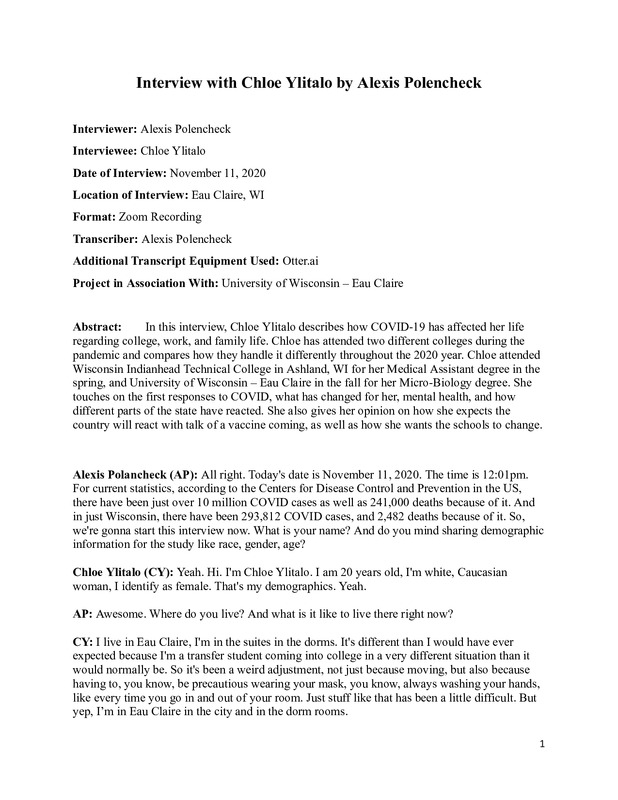 12/05/2020
12/05/2020Chloe Ylitalo Oral History, 2020/12/05
In this interview, Chloe Ylitalo describes how COVID-19 has affected her life regarding college, work, and family life. Chloe has attended two different colleges during the pandemic and compares how they handle it differently throughout the 2020 year. Chloe attended Wisconsin Indianhead Technical College in Ashland, WI for her Medical Assistant degree in the spring, and University of Wisconsin – Eau Claire in the fall for her Micro-Biology degree. She touches on the first responses to COVID, what has changed for her, mental health, and how different parts of the state have reacted. She also gives her opinion on how she expects the country will react with talk of a vaccine coming, as well as how she wants the schools to change. -
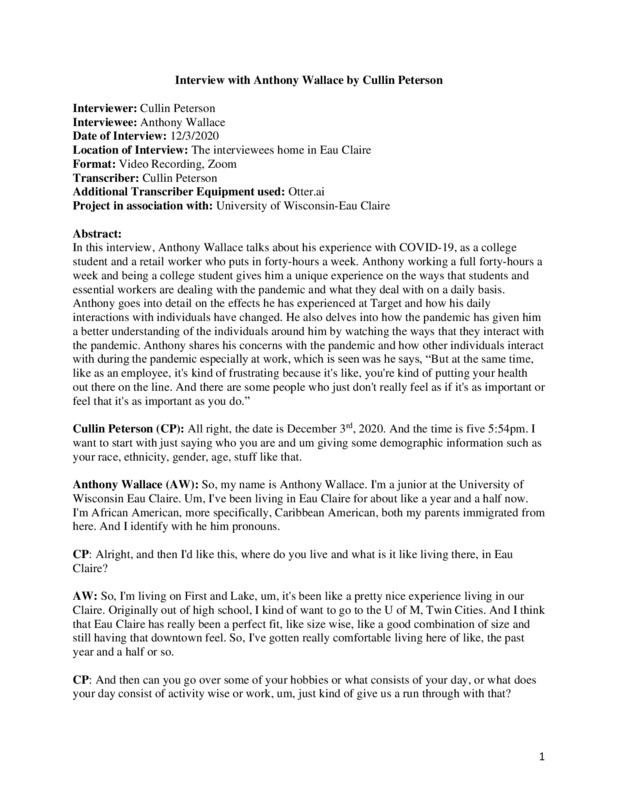 12/11/2020
12/11/2020Anthony Wallace Oral History, 2020/12/11
C19OH -
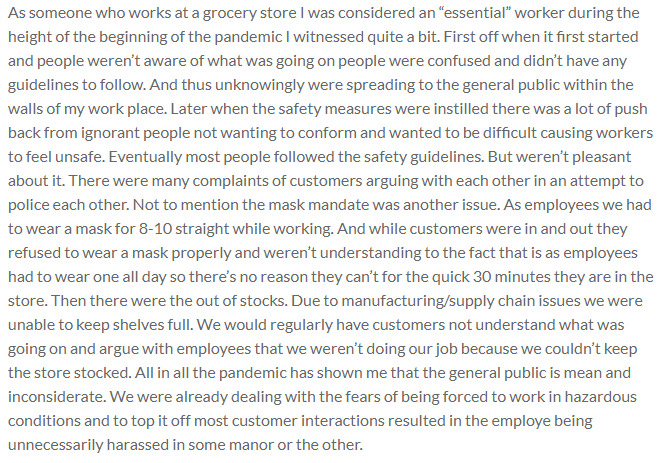 2020-06-01
2020-06-01Retail in Covid
As someone who works at a grocery store I was considered an “essential” worker during the height of the beginning of the pandemic I witnessed quite a bit. First off when it first started and people weren’t aware of what was going on people were confused and didn’t have any guidelines to follow. And thus unknowingly were spreading to the general public within the walls of my work place. Later when the safety measures were instilled there was a lot of push back from ignorant people not wanting to conform and wanted to be difficult causing workers to feel unsafe. Eventually most people followed the safety guidelines. But weren’t pleasant about it. There were many complaints of customers arguing with each other in an attempt to police each other. Not to mention the mask mandate was another issue. As employees we had to wear a mask for 8-10 straight while working. And while customers were in and out they refused to wear a mask properly and weren’t understanding to the fact that is as employees had to wear one all day so there’s no reason they can’t for the quick 30 minutes they are in the store. Then there were the out of stocks. Due to manufacturing/supply chain issues we were unable to keep shelves full. We would regularly have customers not understand what was going on and argue with employees that we weren’t doing our job because we couldn’t keep the store stocked. All in all the pandemic has shown me that the general public is mean and inconsiderate. We were already dealing with the fears of being forced to work in hazardous conditions and to top it off most customer interactions resulted in the employe being unnecessarily harassed in some manor or the other.
